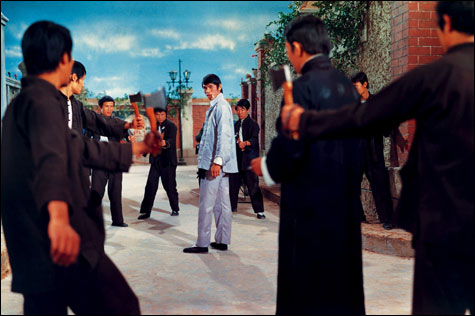
KING BOXER: Chung Chang-wa’s film kicked off the international martial-arts-movie craze. |
| “Shaw Scope: A History of the Shaw Bros. Studio” | Harvard Film Archive | May 30–June 7 |
As can be seen from the summer blockbuster movies, the Hong Kong film industry has made its mark on Hollywood. For better and worse, its martial-arts genres have influenced moviemakers from Steven Spielberg to Quentin Tarantino — so much so that they’ve drawn the ultimate studio tribute: parody, with the release next week of Adam Sandler’s Don’t Mess with the Zohan and the DreamWorks animation Kung Fu Panda.But Hong Kong cinema means more than kung fu, as the Harvard Film Archive series “Shaw Scope: A History of the Shaw Bros. Studios” demonstrates. The Shaw Brothers dominated Hong Kong film production in the ’60s and ’70s, during which time they produced not only their share of martial-arts epics but also, especially in earlier years, musicals, ghost stories, and melodramas. Neither did they always feature macho male warriors as heroes; long before Kill Bill or Zhang Yimou’s House of Flying Daggers or Ang Lee’s Crouching Tiger, Hidden Dragon, women starred in some of the most successful Shaw Brothers martial-arts movies.

True, they would often be disguised as men, as in King Hu’s COME DRINK WITH ME (1966; June 6 at 9 pm). Zheng Peipei (who would play a major role decades later in Crouching Tiger) dons a rather unconvincing male disguise as “Golden Swallow,” an agent assigned to rescue a government official —her brother, and the governor’s son — who’s been kidnapped by a gang of hoodlums. Her first encounters with the gang, a colorful bunch of Dick Tracy–like oddballs with names like Jade Face and Smiling Tiger, go well, even a high-flying showdown in a tavern. (Tarantino might be planning a remake.) But perhaps out of a need to overcompensate for her gender, Golden Swallow finds herself in over her head. She has spurned the solicitations of Drunken Cat, the annoying barfly who keeps popping up at the most inopportune moments; it turns out, however, that she’s not the only one whose appearance is misleading. There’s a lesson to be learned by everyone, and the meticulous and authentic fight choreography, even four decades later, still thrills, even as the deliberate, operatic pacing provides a welcome respite from the neck-breaking pace of today’s action movies.
Speaking of operatic cross-dressing cinema: perhaps the rarest treat in this series is Li Hanxiang’s THE LOVE ETERNE (1963; May 31 at 7 pm), an example of the “huangmei” (“yellow plum”) genre, which involves sung dialogue and a chorus providing narrative. A smash hit for the Shaw Brothers in Asia, it tells the legendary story of Ying Tai (Betty Loh Ti) a young woman who enters an all-male school by disguising herself. There she bonds with fellow student Shan Bo (Ivy Ling Bo), and the sparks and gender confusion fly. It’s Yentl, Chinese style, with the added twist that both characters are played by women.
Love would be worth a look if only for a subversive feminism that predated the US women’s movement by nearly a decade. More compelling, though, are Li’s subtly beautiful set designs and his seductive orchestration of atmosphere and mood. In one key sequence, Shan Bo accompanies Ying Tai back home through the lilacs and bubbling brooks of a gorgeous spring, bewildered by the broad hints Ying Tai has dropped in song about her identity and her desire. Later he learns the truth and makes the journey again, recalling each clue along the way, his jubilant song countered by the now ominous late-fall landscape.
An auteur in his own right, Li is also represented in this series by the supernatural melodrama THE ENCHANTING SHADOW (1960; June 1 at 9:30 pm), in which his evocative mise-en-scène combines with a Roger Corman–like luridness. As in Love, women take the leading roles, though less heroically. A naive young man finds lodgings in a haunted temple. Visited by a beautiful specter, he chastely declines her advances, infuriating the vampiric harridan who controls her. A crusty swordsman helps out, but he seems an afterthought; Li seems to have more sympathy with his empowered if wicked women than with his male protagonists.
Likewise Chu Yuan in INTIMATE CONFESSIONS OF A CHINESE COURTESAN (1972; May 31 at 9:30 pm), a wild entertainment that combines The Story of O with Sudden Impact. Kidnapped, raped, and forced into prostitution, feisty Ai Nu (Lili He) realizes that she can’t succeed by open rebellion, so she plays along with her captors in order to ingratiate herself with them. Making her job easier is brothel madam Chun (Lili Yue Hua), a stunning lesbian and martial-arts expert who enjoys driving her fingertips into a male victim’s chest and licking the blood off.